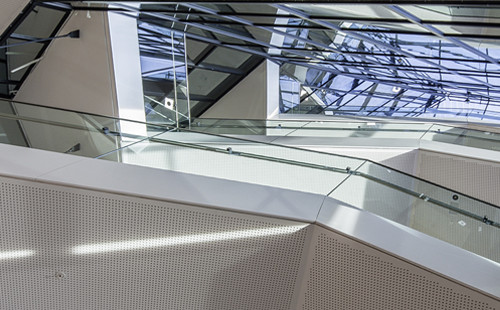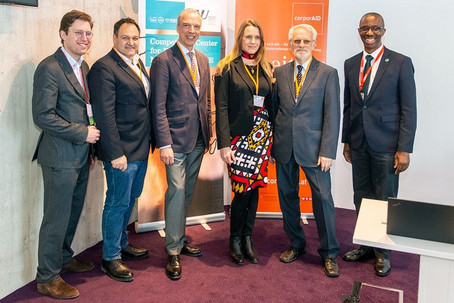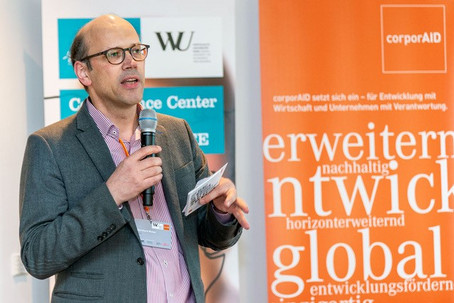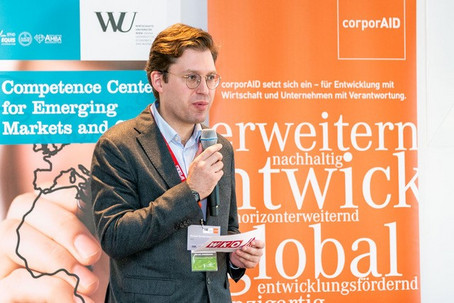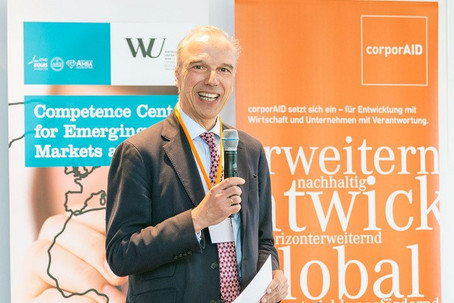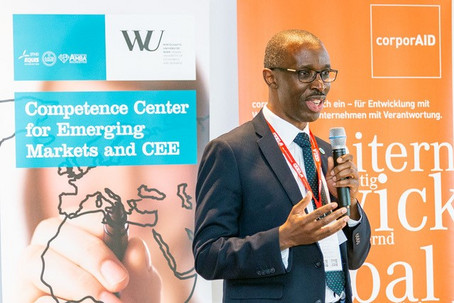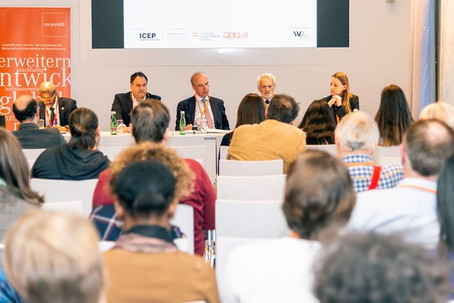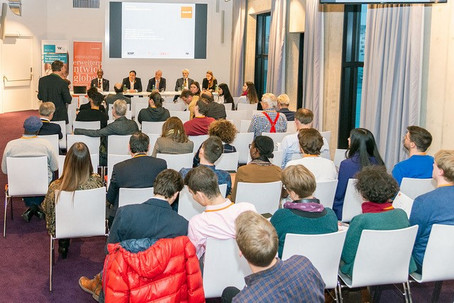Doing Business in Africa, 9.03.2020
Doing Business in Africa
March 9th, 2020, Executive Academy - Sky Lounge
On March 9th, the Competence Center for EM & CEE hosted a panel discussion on “Doing Business in Africa” that was organized in cooperation with corporAID/ICEP and Advantage Austria. The following participants talked about their business experiences in Africa, particularly in sub-Saharan Africa:
Nella Hengstler, Regional Director Africa/Middle East, Advantage Austria/WKO
Thomas Kopp, CEO, 3LOG premium logistics
Anton Novotny, Managing Director, CEMCON Mineral Industry Supplies & Services
Madara Ogot, Professor and Vice-Chandellor, University of Nairobi
Arnold Schuh, Director of the Center for Emerging Markets & CEE, WU Wien
After a welcome by Bernhard Weber, Managing Director, ICEP and Michael Zimmermann, Advantage Austria, WKO the event was started with a presentation from keynote speaker Prof. Madara Ogot about the “Business environment in sub-Saharan Africa” (hereinafter SSA). Referring to the fact, that the region represents 54 countries with varying characteristics Prof. Ogot tried to give a general overview and highlighted numerous trends and opportunities for foreign firms on the continent. Fast economic growth, growing urbanization and industrialization, and improved digital and mobile access characterize the market potential in SSA. Closing the infrastructure gap is one of the challenges that can be seen as opportunity at the same time. Of course, he addressed the other challenges such as corruption, political instability, high tax rates and difficult access to financing and electricity too – but things are changing here for the better.
He concluded with a key message addressed to everyone interested in doing business in SSA: “Think differently! Everyone who wants to take a step into SSA should be willing to dig deeper into the local culture and develop a specific “Africa growth strategy” instead of a “one fits all growth strategy”.
The presentation was then followed by a discussion, moderated by our Director Arnold Schuh.
Arnold Schuh: Why did you decide to do business in Africa?
Thomas Kopp: I personally decided to go to Africa for two reasons: First of all, I am in the logistics business, so I always have to think global. Secondly, from my point of view, SSA is a very important market for transport and logistics. So far, China has invested heavily and publicly visible in Africa and taken over business there. Just think about the Silk Road. Our company, for example, offers shipments from the harbor of Dar es Salaam to Lubumbashi in the Democratic Republic of the Congo. That is a distance of approximately 3,000 km and takes for a truck more or less one week to go there. This is actually a point where our customers are asking: “Why is this transport from the harbor of Dar es Salaam to Lubumbashi about 8,000- 9,000 US-$ even though it is just 3,000 km?” But you have to think about the time it takes for the truck to get there and come back. It takes probably three weeks, especially when there is the rainy season or when the truck gets stuck in the ground. These are issues that you usually don’t expect when acting from Europe, but they have to be considered.
Arnold Schuh: It is interesting to see what you as a logistics company are facing. Now let’s turn to engineering and Anton Novotny. Could you briefly tell us what you are doing in and what is your experience with Africa?
Anton Novotny: My name is Anton Novotny and I am the Managing Director of CEMCON. My career in Africa started in 1977, when I left Japan to work in Tanzania for a plant-project for my former company. The company decided that I will be the team leader in Africa. Then I came to Nigeria in 1982 for a plant project. This plant was built by a European company and there was no Chinese staff around. There were about 70 engineers from Europe but the skilled workers were all Nigerians. Nowadays, when they build a cement-plant in Africa we see more Chinese people than Africans working there. I started my own company in 2001, supplying the Nigerian cement industry by bringing European equipment and engineering know-how to Africa. Right now, one of our successful businesses is replacing the Chinese equipment running at high operating costs with European equipment of better quality. Most of our transactions are done in the local currency - it is risky but possible.
Schuh: Nella Hengstler, what are the typical challenges for Austrian firms in Africa?
Nella Hengstler: Having been Austrian Trade Commissioner in Lagos, Nigeria, the last seven years I have seen that Austrian companies have become more interested in doing business in SSA – but a lot of companies struggle with how to do it. Austrian firms are rather smaller companies and it is quite usual that they are more risk-adverse. It takes a lot of preparatory work and efforts to take this step and to be successful. As the Austrian export agency it is our job to help our companies entering such markets. The African markets are the last frontier-markets. In Africa there are the most places in the world where you can still be the first to enter a specific market. However, one can’t just “do a little bit of Africa”- you have to engage with the locals, build relationships and eventually think about investing, for example, in a local sales office to represent your company. Europe has a good reputation but you have to be present there. My advice is to go for it 100% or rethink your engagement.
Arnold Schuh: Professor Ogot, European companies selling high quality products often have to build up the whole business ecosystem there, educate distributors, suppliers and end users. That takes a lot of time and investments. Is it right that this is a difficulty for high quality product and service providers when doing business in Africa?
Madara Ogot: That is a though question because it depends especially on the product you want to sell and in which country. It begins with finding the right local partner. The local partner may not be making or selling exactly what you are producing but it could be related. Therefore, they would be able to give you their local expertise and bring you the other necessary partner companies. Here is an example: VW used to assemble cars in Kenia, and then they left. In 2016 VW came back with a different strategy: First, they found a local partner that assembles already Japanese, American cars and now VW cars as well. This is a different approach. It is based on a better understanding of the local industry and market. So, finding a local partner is very important.
If you are a small business, it might be possible that you have a niche product that is ready to be sold. Again here, you might not have enough financial resources and don’t want to take that many risks. Here I have another example for Kenya. In Kenya the big mobile brands such as Apple, Huawei and Samsung hold only a small market share because due to the brand positioning and many additional features they are too expensive. Most of the customers only need basic features such as the access to internet and instant messaging via SMS. So, a Chinese company came and started selling phones with fewer features but much cheaper – perfect for the local market. It is always about understanding the market and what people need.
Arnold Schuh: Thank you all very much. I would like to open the discussion for questions from the audience.
Question: I am a consultant and throughout my work I got the impression that China is in the best position in Africa right now. Nevertheless, there is another player making inroads – Turkey. How do you see Turkey as a business partner for Africa?
Nella Hengstler: I’m aware of this development. I think Turkey has a strategy for Africa as they also opened many embassies there in the last couple of years. So far, the Chinese are more engaged in financing infrastructure projects such as railway projects and selling cheap everyday consumer goods. Turkey, on the other hand, is perceived as being more expensive but trustworthy. So, what we are trying to do as well is to bring in Austrian firms as third-party companies, namely partners and suppliers of Turkish companies operating in Africa.
Madara Ogot: May I add that Turkey has a bigger presence now in Kenya. People view Turkey as a European country and therefor associate it with good quality. However, there is one reason why China has a big advantage over any European country or the USA: Access! Getting visa as a Kenyan for China only takes a couple of days. For Europe or the USA this is extremely difficult, making oversees business meetings more complicated. That is also a reason why more and more business connections go towards the Asian countries.
Question: I am a student here at WU and my master thesis is about financing SME’s in emerging markets. What are the financing opportunities in Africa, especially for SME’s?
Madara Ogot: In Kenya, we actually don’t talk about SME’s, here we say “Micro & Small” (MS) because the majority of businesses is micro. So, taking a loan from the bank is often not an option because the businesses are too small and don’t generate enough revenue. There are some large micro finance institutions and government programs. The challenge is that entrepreneurs still don’t like to borrow as they are risk averse and fear to lose the family assets. Therefore, there are a lot of informal social groups such as relatives, friends and neighbors where they borrow money at a lower cost and risk.
Arnold Schuh: Before finishing the panel discussion, do you have any final recommendation or any advice for people seeking to do business in Africa?
Nella Hengstler: I think, you have to show more than interest in the topic and have no issues to go and be engaged on the ground there.
Anton Novotny: If you are an adventurous type - go to Africa!
Thomas Kopp: Be brave, adapt yourself to the local market and never forget: It’s a marathon not a sprint.
Madara Ogot: You are welcome to invest in Nairobi.
Résumé:
Africa shows many opportunities for Austrian companies wishing to enter the market
Being successful in Africa demands local presence to gain deep local insights
100% commitment – otherwise rethink your engagement
There is no one-fits-it-all solution.
